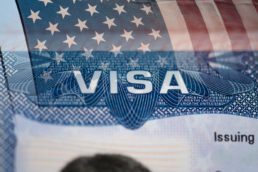With summer right around the corner, many families in the U.S and Canada alike are gearing up for beach days, camping trips, and visits to family across the border. While crossing the border with your children isn’t anything to stress about, there are some useful things to know when planning your trip.
Customs officers are always on the lookout for child abduction, and as such, may ask detailed questions about the children traveling with you. The best way to prove guardianship is by getting your child a passport, however there are other options. Children under 16 have the ability to enter the U.S or Canada by using one of the following:
- U.S or Canadian passport;
- Original or copy of their birth certificate;
- Naturalization certificate;
- Canadian citizenship card; or
- Consular report of birth abroad.
Anyone over the age of 16 is required to have a passport or enhanced license/learner’s permit to enter the U.S or Canada. While in some circumstances there are alternatives, a passport or enhanced license/learner’s permit are the most common forms of documentation for anyone over the age of 16.
If you’re headed across the border in a group of vehicles, it’s important that you are in the same vehicle as your child when arriving at the crossing. For example, you may be planning a vacation across the border with your extended family. While your child may want to ride with a grandparent, uncle, or aunt, ensuring that your child is in your vehicle when you reach the inspection station will make for a much easier trip.
Children old enough to speak for themselves may be encouraged to do so by the customs officer. They might be asked to confirm their name, age, or date of birth. So, before you leave, let your child know that this is a possibility and make sure they are prepared to answer the officer’s questions.
For children traveling with only one parent, it is strongly recommended that they have a consent letter from the other parent granting you permission to take the child out of the country. This consent letter is even more important if the child is traveling with a friend or relative and neither parent is present. While a consent letter is not legally required, it puts all the information the customs officer needs in one spot and demonstrates that you took the time to get the necessary approval. When it comes to providing a consent letter, please note the following:
- Divorced parents with joint custody should always have their legal custody documents on them and be able to provide a consent letter from the other parent.
- Legal guardians should be ready to present a copy of the court order granting them guardianship.
- If a child is using a birth certificate with only one parent’s name and they are travelling with the other parent, a certified copy of the child’s birth certificate should be presented to the customs officer.
- A fax copy of a consent letter is perfectly acceptable, but an original is always better.
When you arrive at the inspection station, it is up to the border officials to determine if something is wrong. If only one parent is present or if the child is with other relatives or friends, the customs officer may ask about the child and the current circumstances. They may just simply let you through without any questions. If there are any concerns, it is their responsibility to examine the situation and determine their course of action. Ultimately, if you are not doing anything wrong, then there should be nothing to worry about.
If you have questions on crossing the border, be sure to contact our office to schedule a consultation with one of our attorneys today!
Ready to have Berardi on your side?
Whether you’re a business looking to hire or a professional hoping to relocate, immigration law can be complicated. But you don’t have to do it alone. Put our experience to work for you.



